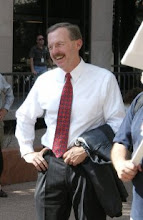 WALL STREET JOURNAL -- OPINION ASIA ~ JANUARY 25, 2010, 6:49 P.M. ET
WALL STREET JOURNAL -- OPINION ASIA ~ JANUARY 25, 2010, 6:49 P.M. ETHanoi and the Lawyer
A 'political' crackdown ensnares a well-known commercial litigator.
Hanoi's practice of jailing dissenters isn't new, but even so the case of Le Cong Dinh stands out. For as much as Hanoi tries, it can't lock up prominent businessmen like Mr. Dinh without sending a message to the foreign business community it so desperately needs.
Mr. Dinh was arrested in June and accused of traveling to Thailand to meet with members of the banned pro-democracy Vietnam Reform Party, to which he "confessed" in state-run media. For that, the government charged him with subversion, a capital charge not used against political dissenters since the 1980s. He was sentenced in a Ho Chi Minh City court to five years in jail on Wednesday, his jail time reduced apparently in exchange for publicly admitting his "crimes." One of his three co-defendants, Huynh Duy Thuc, was sentenced to 16 years.
Mr. Dinh's case, including the application of the stricter subversion law, marks another step in a crackdown gathering steam ahead of next year's Communist Party Congress. The political tightening has included trials and prison terms for bloggers and dissidents who have criticized Hanoi over a range of issues, from its handling of a territorial dispute with China in the South China Sea to a bauxite mine in the center of the country. Mr. Dinh represented several of these defendants.
This latest trial, however, brings the crackdown close to home for foreign investors. Mr. Dinh is a former vice-chairman of the Ho Chi Minh City Bar Association and studied law at Tulane University in New Orleans on a Fulbright Scholarship. His firm, DC Law, has represented companies such as Yahoo and Michelin. He successfully defended the Vietnamese government in a trade case before the U.S. Department of Commerce in 2003.
Foreigners aren't immune to the country's questionable rule of law. Hanoi has prevented two Australian Qantas Airways executives from leaving the country since mid-December to assist in an "investigation" against a former colleague, even though neither has been charged with a crime. Then there was the 2006 ABN-AMRO case, when authorities detained foreign bank employees and then extracted a ransom for their release.
The United States condemned Mr. Dinh's sentencing last week. Ambassador Michael Michalak in December criticized Hanoi's broader crackdown, noting that free access to information and discussion "are absolutely essential to technical innovation and economic prosperity." But so far U.S. businesses have been slow to react to Mr. Dinh's case. Adam Sitkoff of the American Chamber in Hanoi says the group is reluctant to comment on "political" matters.
Companies may conclude that a withdrawal from Vietnam, a la Google from China, isn't the appropriate course. But Hanoi can't take such corporate goodwill for granted forever. Foreign businesses could help by reminding the government that investors do indeed notice when their lawyers get sent to jail for "crimes" that wouldn't be illegal in any normal country.




Great knowledge, do anyone mind merely reference back to it lemon law lawyer los angeles
ReplyDeleteI am continually amazed by the amount of information available on this subject. What you presented was well researched and well worded in order to get your stand on this across to all your readers. tort motor vehicle
ReplyDelete